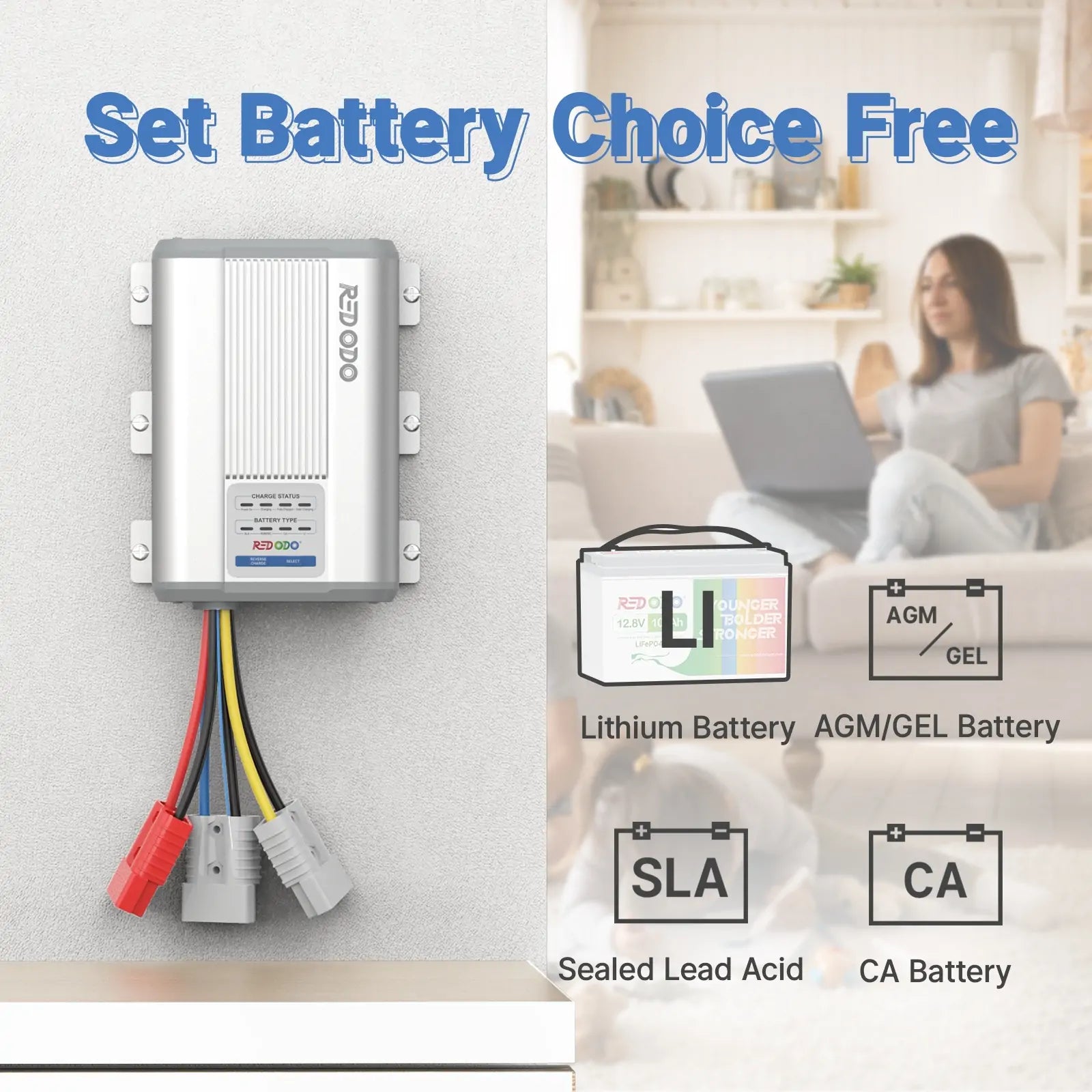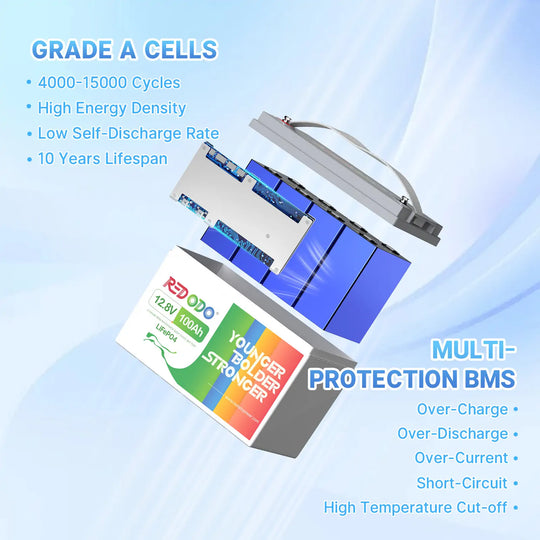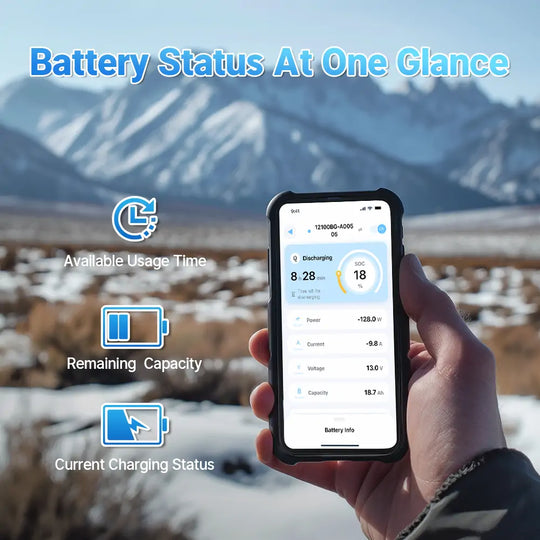Are you gearing up for a boondocking adventure and curious about the lifespan of your RV battery? Boondocking, or dry camping, offers the excitement of off-grid living but necessitates careful management of your power supply. Your RV battery becomes your essential resource while off the grid, supplying power for lights, appliances, and electronics.
Understanding how long your RV battery will last while boondocking is essential for a successful and enjoyable trip.
What's the Ideal RV and Travel Trailer Battery for Dry Camping and Boondocking?
Camping has been a beloved American tradition for generations, offering a refreshing escape to the great outdoors. Picture a relaxing weekend getaway, especially with the luxury of a spacious travel trailer or RV. As camping has evolved, new trends like boondocking and dry camping have emerged, enriching the camping experience.
Dry camping refers to camping without hookups, often at RV parks with amenities such as shower houses and pools. Boondocking, on the other hand, goes a step further by involving off-grid camping without the comforts of a traditional campground. This could mean staying at a truck stop, a Walmart parking lot, or a peaceful spot in a national forest, with no electrical hookups or readily available amenities. In these situations, a reliable and efficient RV battery setup is crucial for a comfortable and enjoyable stay.
Understanding the Best Batteries for Boondocking and Dry Camping
For families or couples looking to connect in the peacefulness of nature, proper planning and execution are crucial. This is why boondockers and dry campers ensure their travel trailers or RVs are equipped with reliable batteries. To choose the best RV battery for your needs, it's important to start with a basic understanding of your systems and power requirements.
Your RV is Powered by Two Main Systems
1. 120-Volt AC System: This system powers luxury items such as the refrigerator, microwave, and air conditioning. It typically draws electricity from shore power or a generator, and charges the battery bank when plugged in. However, for boondocking and dry camping, shore power is not available, so alternative power sources like generators or solar panels are utilized.
2. 12-Volt Deep Cycle Battery: Known as the "house battery," "leisure battery," or "service battery," this powers essentials like lighting, the water system, and overhead fans. For boondocking and dry camping, this battery can be your sole power source. However, when disconnected from all power sources, its charge will last only for a limited time.
Selecting the Right 12-Volt Deep Cycle Battery
When it comes to off-grid camping, selecting the right 12-volt deep cycle battery is essential. This battery powers critical functions such as pumping water, providing illumination, and operating safety devices. Without a reliable and long-lasting 12-volt DC battery, your adventure could be cut short.
Essentially, along with a comfortable bed and freedom from mosquitoes, a dependable house battery is what distinguishes boondocking from simply sleeping in a tent. A trusted 12-volt house battery is an indispensable component of any successful boondocking or dry camping adventure.
Many boondockers and dry campers opt to use two 12-volt batteries. Generally, this setup provides sufficient power to maintain lighting at night, operate vent fans during the day, charge electronic devices, use the water pump, and run a propane furnace overnight. Doubling the power is achievable by employing lithium (LiFePO4) RV batteries due to their 100% depth of discharge (DOD), compared to traditional lead-acid batteries which only have 50% DOD.
Typically, depending on your power usage, boondocking can be sustained for 2 to 7 days. However, the duration largely depends on the type of batteries you use. Inefficient batteries with limited charge-holding capacity can significantly shorten your trip. Therefore, it is crucial to select the most suitable battery to meet your specific requirements.
Here’s an example:
|
Equipment (Typical example) |
Current (Amps) |
Multiply by |
Hours of use |
= |
Amp hour rating (AH) |
|
One fluorescent tube |
0.75 |
x |
5 |
= |
3.75 |
|
2 halogen lights |
1.50 |
x |
3 |
= |
4.50 |
|
LCD TV |
2.5 |
x |
4 |
= |
10.00 |
|
TV booster |
0.05 |
x |
4 |
= |
0.20 |
|
Water pump |
0.7 |
x |
0.5 |
= |
0.35 |
|
Motor mover |
30 (Average) |
x |
0.3 |
= |
9.00 |
Sub Total | = | 27.8 (For winter use, add an extra 10%)
Add 20% safety margin | = | 5.56
Total Ampere Hours required per day | = | 33.36
So if you have a 100ah battery, it would last 3-4 days.
How Do You Charge RV Batteries?
There are two effective methods to charge your RV batteries while boondocking. First, you can use a DC to DC charger. It's important to choose a high-quality charger that delivers at least a 40-amp charge rate. When you run your generator for an hour, the DC-DC charger will provide 40 amps of power to your RV battery.

The second method involves permanently installing an MPPT (Maximum Power Point Tracking) solar charge controller for solar panels. This type of charger optimizes performance, maximizing the power output from your solar panels.

Do RV Batteries Charge While Driving?
While RV batteries can charge while you drive, the process is relatively slow. Typically, the vehicle's alternator charges the batteries when the engine is running. However, the charging rate is limited by the alternator's output, which is primarily designed to power the vehicle's electrical systems and charge the starting battery.
Several factors influence the charging rate while driving, including the alternator's capacity, the batteries' state of charge, and the vehicle's electrical load. As a result, the alternator usually provides a trickle charge to the RV house batteries, leading to a slower charging process.
For faster and more consistent charging, especially when the batteries are deeply discharged or when additional power needs arise, using a dedicated battery charger or installing solar panels with a solar charge controller offers a more efficient charging solution for RV house batteries.
Best RV & Travel Trailer Battery For Dry Camping & Boondocking: Lead-Acid VS Lithium
If you're an occasional camper who uses your battery infrequently (perhaps every few years), opting for the least expensive option, such as lead-acid RV batteries, might be suitable.
However, for most campers seeking durability and value, lithium iron phosphate (LiFePO4) batteries offer a safer and longer-lasting solution. For the majority of people, choosing lithium batteries is the superior choice, as it helps prevent battery-related issues during outdoor excursions, allowing for a more enjoyable experience.
While this provides a general overview, delving into the specifics will help determine the most suitable battery for your boondocking adventure and the reasons behind it.
Enhanced Energy Density
Lithium batteries offer a superior energy density, enabling them to store more energy in a smaller and lighter framework. This feature is particularly advantageous in recreational settings where space and weight are critical considerations.
Extended Lifespan
In contrast to lead-acid batteries, lithium batteries generally offer a longer lifespan. They can endure a higher number of charge-discharge cycles, resulting in a significantly extended operational life. For example, Redodo lithium batteries exhibit a life cycle of 4,000 to 15,000 cycles, allowing them to serve effectively for more than 10 years.
Rapid Charging Capability
Lithium batteries offer a significantly faster charging capability compared to lead-acid batteries, which is especially beneficial for people who need quick recharging during their recreational activities.
Reduced Weight
Lithium batteries are noticeably lighter than lead-acid batteries, making them easier to handle and reducing the overall weight of vehicles or equipment.
Low Maintenance
Lithium batteries require minimal maintenance compared to lead-acid batteries, which often require regular checks and upkeep to maintain peak performance.
Stable Voltage Output
During the discharge cycle, lithium batteries maintain a more consistent voltage, which is advantageous for powering sensitive electronics and appliances.
Built-in Safety Features
Lithium batteries come with an integrated battery management system that protects against over-charging, over-discharging, overcurrent, short circuits, high temperatures, and low temperatures.

Bluetooth Function to Track the Battery Statement
This feature is one of the most exciting aspects of lithium batteries. Utilizing Bluetooth technology synced with your smartphone, you can accurately monitor remaining battery power, ensuring uninterrupted boondocking experiences.
We recommend the Redodo 12V 100Ah Smart Bluetooth Lithium Battery, equipped with Smart Bluetooth 5.0.
Through the Redodo app, you can seamlessly monitor real-time battery status and data, including state of charge (SOC), charge/discharge/idle status, battery voltage, current, power, remaining capacity, battery temperature, and life cycles. Simply scan the battery barcode for automatic connection, enabling control over discharge and power-off functions.

Featuring an advanced 100A Battery Management System (BMS), this battery provides 20+ protections and warnings, such as smart Bluetooth capability, low-temperature charging cut-off protection, over-voltage protection, low-voltage protection, over-current protection with auto-recovery, over-temperature protection, short-circuit protection, overload protection, and pre-charging function with a 30mF capacitive load. These features ensure stable, intelligent, and safe operation.
Tips for Extending RV Battery Life
Energy-Efficient Appliances: Choose appliances and lighting that are energy-efficient to minimize power consumption.
LED Lighting: Swap out conventional bulbs with LED lights, which use less energy and can substantially prolong battery lifespan.
Battery Monitoring System: Install a system to monitor battery usage and accurately gauge remaining capacity.
Solar Power: Consider investing in solar panels to recharge your RV battery during daylight hours, reducing dependence on other charging methods.
Battery Maintenance: Maintain your RV battery regularly by keeping it clean, inspecting connections, and ensuring adequate ventilation.
Hope this article can help you. You can also learn more about how to store lithium batteries and how to charge lithium batteries.

Redodo

Redodo
Recent Post

How Long Does a Trolling Motor Battery Last?

Convert RV from Lead-Acid to Lithium Battery: A Complete Guide

How Long Will a 200Ah Battery Run an Air Conditioner?

A Full Review of Redodo 12V 140Ah Group 31 Deep Cycle Battery

![⚡[$220 after Sign-Up] Redodo 12V 100Ah LiFePO4 Lithium Battery | Best Budget | For RV, Solar, Trolling Motor](http://www.redodopower.com/cdn/shop/files/Redodo_12v_100ah_lithium_battery_b9015ddd-64b5-4be2-8c88-392f0bb4ab30.jpg?v=1742973160)
![⚡[$220 after Sign-Up] Redodo 12V 100Ah Group 24 Deep Cycle LiFePO4 Lithium Battery | For Home, RV, Marine](http://www.redodopower.com/cdn/shop/files/Redodo_12V_100Ah_group_24_lithium_battery_6301965d-f6e8-467f-825f-3eec839b3e1f.jpg?v=1744105344)
![⚡[$239 after Sign-Up] Redodo 12V 100Ah Group 24 Bluetooth LiFePO4 Battery | Real-Time Battery Monitoring | For RV, Marine, Solar](http://www.redodopower.com/cdn/shop/files/Redodo_12V_100Ah_group_24_bluetooth_lithium_battery.jpg?v=1744253032)
![⚡[$220 after Sign-Up] Redodo 12V 100Ah Group 31 Bluetooth Lithium Battery | Real-Time Battery Monitoring | For RV, Marine, Solar](http://www.redodopower.com/cdn/shop/files/redodo_12v_100ah_bluetooth.webp?v=1744698930)
![⚡[$220 after Sign-Up] Redodo 12V 100Ah Mini Lithium LiFePO4 Battery | Smallest Battery | For RV, Trolling Motor, Solar](http://www.redodopower.com/cdn/shop/files/Redodo12V100AhMiniLiFePO4LithiumBattery.jpg?v=1739959054)


![⚡[$377 after Sign-Up] Redodo 12V 200Ah Lithium LiFePO4 Battery | 1280W Load Power | For RV, Solar, Off-Grid](http://www.redodopower.com/cdn/shop/files/Redodo12V200ahlithiumbattery.jpg?v=1735892910)
![⚡[$524 after Sign-Up] Redodo 12V 300Ah Lithium LiFePO4 Battery | Replaces 6*12V 100Ah AGM Batteries | RV, Marine, Solar](http://www.redodopower.com/cdn/shop/files/Redodo_12V_300ah_lithium_deep_cycle_battery.png?v=1744797523)
![⚡[$947 after Sign-Up] Redodo 12V 410Ah Lithium LiFePO4 Battery | King of Power | Marine, RV, Solar Home](http://www.redodopower.com/cdn/shop/products/Redodo12V400Ahlithiumbattery-1.jpg?v=1736154087)